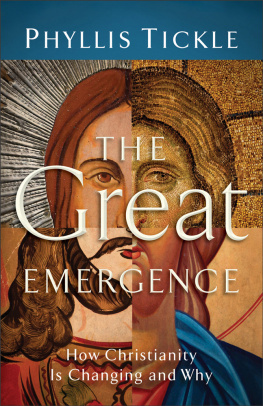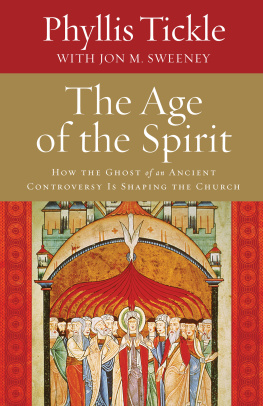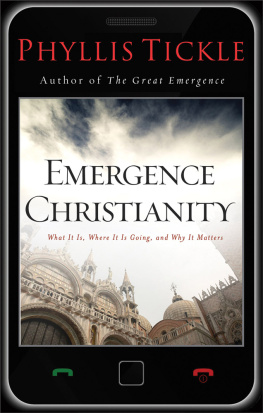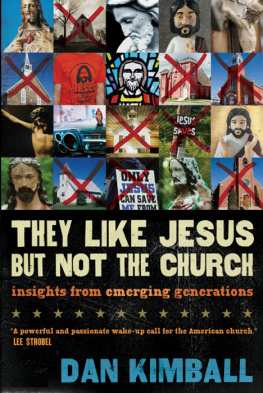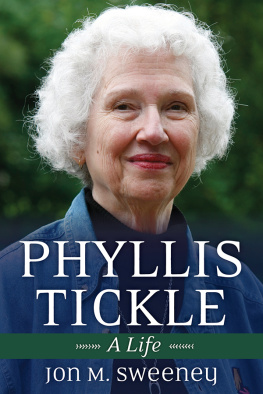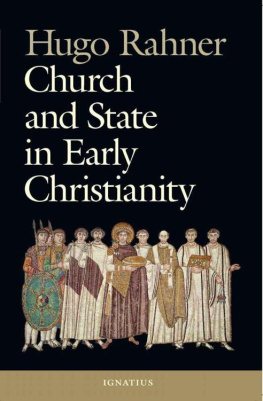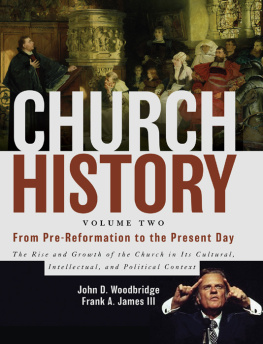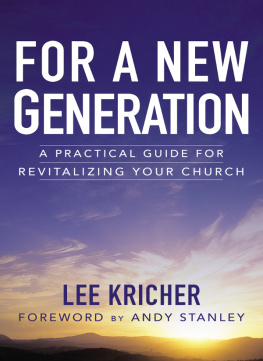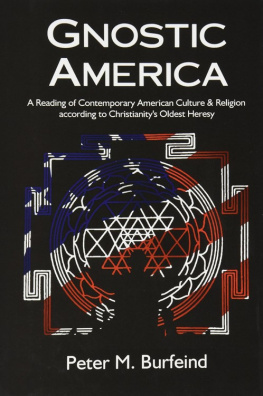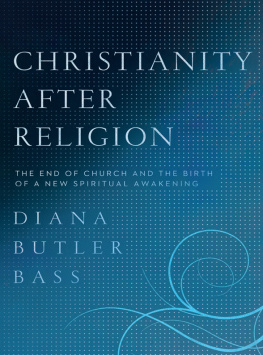Tickle - Great Emergence, The: How Christianity Is Changing and Why
Here you can read online Tickle - Great Emergence, The: How Christianity Is Changing and Why full text of the book (entire story) in english for free. Download pdf and epub, get meaning, cover and reviews about this ebook. City: Grand Rapids, year: 2012, publisher: Baker Publishing Group, genre: Religion. Description of the work, (preface) as well as reviews are available. Best literature library LitArk.com created for fans of good reading and offers a wide selection of genres:
Romance novel
Science fiction
Adventure
Detective
Science
History
Home and family
Prose
Art
Politics
Computer
Non-fiction
Religion
Business
Children
Humor
Choose a favorite category and find really read worthwhile books. Enjoy immersion in the world of imagination, feel the emotions of the characters or learn something new for yourself, make an fascinating discovery.
Great Emergence, The: How Christianity Is Changing and Why: summary, description and annotation
We offer to read an annotation, description, summary or preface (depends on what the author of the book "Great Emergence, The: How Christianity Is Changing and Why" wrote himself). If you haven't found the necessary information about the book — write in the comments, we will try to find it.
Tickle: author's other books
Who wrote Great Emergence, The: How Christianity Is Changing and Why? Find out the surname, the name of the author of the book and a list of all author's works by series.
Great Emergence, The: How Christianity Is Changing and Why — read online for free the complete book (whole text) full work
Below is the text of the book, divided by pages. System saving the place of the last page read, allows you to conveniently read the book "Great Emergence, The: How Christianity Is Changing and Why" online for free, without having to search again every time where you left off. Put a bookmark, and you can go to the page where you finished reading at any time.
Font size:
Interval:
Bookmark:

One singularly sunny midsummer day in 2006, Chad Allen, Doug Pagitt, and his wife, Shelley, took me to lunch. While I remember very little about what we ate, what we talked about has lived in every part of my life every day since, and that is a bold statement.
Allen, who is now editorial director of Baker Books, was an acquisitions editor at the time; and Pagitt was, as he still is, senior pastor of Solomons Porch in Minneapolis and a major voice in Emergent Village and Emergence Christianity both in this country and in the world at large. In 2006 he was also two other things. He was the editor, for Baker Books and in cooperation with Emergent Village, of a line of books designed to present and explicate this new form of Christianity that was burgeoning forth among us. He was also smart enough to bring Shelley to lunch. Of the three of them, she was probably the most persuasive about the fact that what the gentlemen wanted done did indeed want to be done. And what the gentlemen wanted was a book, under the mersion imprint, which would report in narrative form the history of Emergence and describe in accessible terms its place in North American Christianity in the twenty-first century.
Out of that luncheon came, in 2008, the original edition of the book you now hold in your hand. The only difference that has been effected in it over the years is that The Great Emergence no longer bears the mersion imprint, simply because Emergence and the Village have grown to such stature as to no longer need a series of books to introduce themselves to each other or to their fellow Christians. Pagitt, Allen, and Baker Books have done their job well, though I suspect Shelley and I are both a bit sad at the loss of mersion their success has brought with it.
But in all the changes and growth, listening and strenuous praying in the years since that pivotal luncheon, one thing has remained constant: Shelley was right. The Great Emergence and the Emergence Christianity that has come out of it, and that continues to come, have a story that wants telling... a story that must be told... a story both very holy and very human. So if this edition of The Great Emergence can be said to be dedicated to anything other than the urgency of its own message, then it is dedicated to Shelley Pagitt, who knew and understood from the first and had the grace to say so.
A word or two of explanation seems warranted, since what you are about to read has had a somewhat unusual story behind its presentation here.
While I began life as a teacherfirst of Latin to high school students, then as a college instructor, and finally as a college deanI have spent the bulk of my professional career in publishing. I left the academic world in 1971, in fact, to open and run a small Southern publishing house that, over the years, grew and morphed and grew again. All through those years, however, my yearning and urgency were toward my own writing; and in 1990 I left secular publishing to turn my full attention to living the life of the professional writer. But the late eighties and early nineties were also the years when religion was overtaking every other segment of Americas book publishing industry. By 1992, religion as a category of publishing was approaching triple-digit annual growth, and something had to be done by the larger industry to accommodate such massive change.
Publishers Weekly is the trade journal of the book publishing industry in the English language; but prior to 1992, it had not had a religion department for, truth be told, none had been needed. When the tsunami came that year, however, the journal had no choice other than to establish such a department, and quickly. Happily, for me anyway, I knew publishing from years of experience in the industry, I was a devout and observant member of the worlds largest religion, and I was free, more or less.
When Publishers Weekly called, I was startled at first. Most people who think they have the rest of their lives mapped out, only to discover otherwise, are startled, I suppose. But in due time and after further conversation, I was intrigued, came out of my self-imposed retirement-to-write stance, and went to New York to create out of whole cloth something that had never been before, and do it immediately. My training in religion is, as a result, not in any way formal. Rather, I became a student of religion by being cast dead center of the maelstrom and having to learn to swim right there and right then.
For religion books to get to the general readers who were ravenous for them, religion publishers had to be merged into secular media and secular retail book outlets. The industrys trade journal was the logical forum for the transfer of the data and information required to effect such an integration of the niche into the general market. Many secular publishing houses, for their part, had never done much, if any, religion publishing. Suddenly, however, they had to have effective, accessible, and deadly accurate information about what was happening in American religion, why it was happening, what to publish that would feed the needs thus identified, and what was likely to come next. Again, the industrys journal was the immediately obvious place for that transfer of data.
Over the years of that exchange, I changed too, of course. I became what is called a public intellectual or, in my old haunts as an academic, would have been called a scholar without portfolio. What those terms mean is that I was in a field where there were not yet programs for formal training. I was, to use the more common expression, receiving on-the-job training in spades. I was being transformed into a sociologist of religion as it is commercially applied; I was learning to see religion and its patterns as they could be tracked and validated in sales figures and book subcategories and title/format flow as well as in more traditional demographic studies. I also (for I shall always be an academic) began to read and study what scholars had said, and were saying, about religion both now and in other times of upheaval and flux. Always, obviously, I read through the lens of my own professional obligations at Publishers Weekly and in terms of my own industrys stated expectations of what their trade journal should provide; but I also learned far more than what was immediately applicable to publishing needs and purposes.
As a Christian, I became increasingly persuaded that what Publishers Weekly had taught me or had allowed me to learn had a greater place in the Christian community at large. Accordingly, I resigned my post at the journal and began a whole new life of talking to peopleboth lay and ordainedaround the country about what it is that is happening to us just now, and why, and to what probable result. The book you are about to read is, in essence, a hard copy at last of what those lectures and speeches and interviews have been about.
One of the great joys for me in writing this book has, in fact, been the realization that at last I am being given the opportunity to assemble into one coherent, narrative whole what I have been delivering in pieces and parts for the last several years. I am grateful for that gift, just as I shall remain always grateful to those of you who come to share with me here this particular overview of the Great Emergence through which we are presently living.
Cable of Meaning
The Loss and Discovery of a Common Story
Any careful reader will already have observed that in each of our five-hundred-year hinge times more than religion has been in turmoil. There is a very good reason for that: religion is a social construct. As an assertion so bald-facedly stated, this one is often offensive initially to many people of deep faith. That does not change the truth of the statement. Religion is a social construct as well as an individual or private way of being and understanding.
Font size:
Interval:
Bookmark:
Similar books «Great Emergence, The: How Christianity Is Changing and Why»
Look at similar books to Great Emergence, The: How Christianity Is Changing and Why. We have selected literature similar in name and meaning in the hope of providing readers with more options to find new, interesting, not yet read works.
Discussion, reviews of the book Great Emergence, The: How Christianity Is Changing and Why and just readers' own opinions. Leave your comments, write what you think about the work, its meaning or the main characters. Specify what exactly you liked and what you didn't like, and why you think so.

